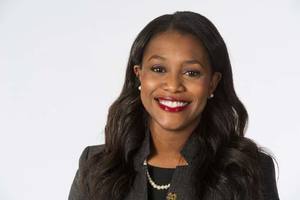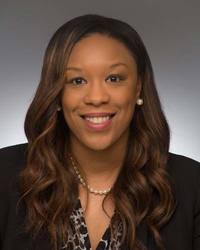
Handling emotionally charged issues is a regular part of Karrah Miller’s job. “But I want more work,” she says.
You read that right. “Everyone who comes here to work or learn should thrive in an environment free of discrimination and harassment,” says Miller, who took the helm last fall as director of the Office of Institutional Equity (OIE) and Title IX coordinator. “I want to see more people coming to our office,” she confirms.
The OIE provides leadership and support regarding principles of fair treatment and equal opportunity for all students, faculty, staff and job applicants. Miller wants to ensure those principles are ingrained in the Notre Dame culture.
Because that culture begins with compliance, Miller oversees three major areas of responsibility for the University: the Americans with Disabilities Act, Title VII of the Civil Rights Act of 1964 and Title IX. Together, these laws prohibit a wide variety of harassment or discrimination on several bases such as sex, race, religion, disability and others.
"We want people to understand the benefits — how these policies enhance the vision and mission of the University."
When discrimination or harassment does happen, Miller’s office is there to help. “We want a culture of reporting. That will mean people are coming to us with problems, and we will help them.”
Helping comes naturally to Miller, the daughter of a local pastor. “I grew up in a family responsible for helping the community. The work I do is similar to ministry—my parents solve issues on the spiritual side, and I am blessed to help resolve issues related to our emotional well-being in the workplace,” she says.
Miller was driven to make a difference in her hometown after taking an eye-opening law school class in higher education law. “Disability accommodation, affirmative action planning, sexual harassment—these aren’t just legal issues for Notre Dame, they are human issues,” says Miller, who emphasizes the OIE serves not only the University, but “all individuals who are a part of it.”
When an issue arises, she says, “we want every employee to feel comfortable coming forward. We will conduct a thorough and impartial investigation.”
All-campus education and training
Though investigations are a part of her job, Miller would rather inform than enforce. The OIE offers regular training programs, and Miller hopes to offer more. “When recognition of these issues is part of our culture, there’s less to investigate.”
For example, new employees learn about the University’s positive work environment and non-retaliation policies during onboarding.
Recent amendments to the Clery Act also require students, faculty and staff to be educated on the prevention of domestic violence, dating violence, and stalking. “We will soon be retraining all of campus on those issues,” Miller says.
Miller hopes to make these topics approachable and conversational. “I like a softer approach rather than a legalistic one,” she says. “We want people to understand the benefits — how these policies enhance the vision and mission of the University.”
Disability Accommodations

When a faculty or staff member requires an adjustment to work responsibilities to accommodate a disability, Monique Frazier, the OIE’s new ADA program manager, helps meet those needs.
Formerly a case manager with the Indiana Department of Child Services, Frazier has seen the emotional toll that the pursuit of equal opportunity can take on families of children with disabilities. “When I saw their experiences, that’s when this became my passion,” she says.
“I want to remove the stigma associated with accommodations,” says Frazier, who notes they are more than just a legal right. “It is important both to the University and those we serve to ensure the arrangements made are honored and everyone is treated with respect.”
Accommodations have been made for those with such conditions as post-traumatic stress disorder, anxiety, multiple sclerosis or physical limitations. For short-term impairments such as a broken leg or recovery from surgery, temporary restrictions (such as a limitation on heavy lifting) may be crafted in conjunction with supervisors.
Looking ahead
The OIE has seen many transitions in the past few years, notes Miller, who is pleased by the University community’s increased awareness of the services her office provides. “Bob [McQuade, vice president of Human Resources] has been working very closely with us to make sure this office is built the way it should be, and that confidence in this office is where it should be.”
Where to turn for help
If working with your supervisor to resolve an issue is not an option:
- For equity-related issues or policy questions: Office of Institutional Equity, 631-0444 or equity. nd.edu.
- For issues regarding staff: contact any human resources consultant, or the OIE.
- For issues involving faculty: Todd Dvorak, faculty affairs specialist, Office of Human Resources, 631-5900.
- For thefts, substance abuses, safety issues or any violations of law or regulatory compliance: ND Integrity Line, 1-800-688-9918, or report online at globalcompliance.com. Available 24 hours a day. Users may remain anonymous.
This story was originally published in NDWorks.